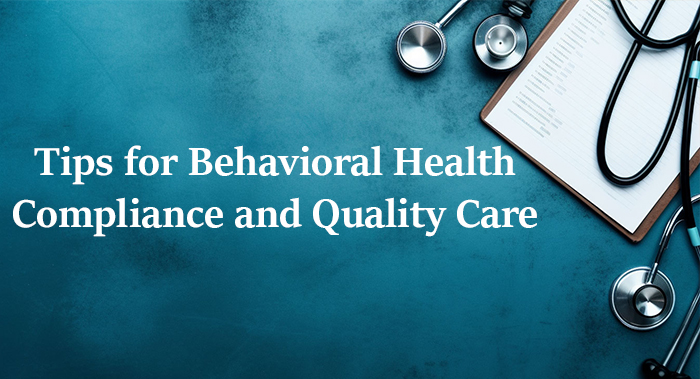
Common Tips for Behavioral Health Compliance and Quality Care
In healthcare organizations, it's really important to have a strong focus on following rules and guidelines. This is because a lot of what we do relies on the people working there and the way things are done. If we don't have consistent ways of doing things, there's more chance that things could go wrong or cause problems.
Forming a compliance culture in behavioral health
Behavioral health’s unique challenges mean these organizations are ripe for a strong compliance culture. The tips can help you start navigating behavioral health’s complexities and show how Compliance adds value by minimizing risk through standardization and building in predictable processes.
Following rules and regulations is very important in the field of behavioral health, as it is directly connected to the quality of care and patient outcomes. When you follow the guidelines set by the state and federal authorities, you are more likely to provide the best possible care to your patients, keeping their needs for privacy and safety in mind.
Checking your operations for compliance helps your organization to be more efficient and reduces the chances of making mistakes. However, if you fail to comply with the rules, there could be severe consequences. For example, you must meet the requirements of insurance companies to receive payment for your services. Additionally, violation of regulations in other areas may result in hefty fines or even the loss of your healthcare license.
Implementing an effective compliance program is crucial for organizations to protect themselves from legal and internal risks. Here are five tips for creating a successful compliance program.
- Create well-defined policies and procedures that serve to safeguard your organization from external legal risks as well as internal ones.
- Train and educate your staff on these policies and procedures to ensure that they are familiar with them. Healthcare compliance webinars and education based on areas of risk are essential to maintain an active culture of compliance. In behavioral health, it's crucial to understand that education and training play a vital role in ensuring compliance. It's not just new employees who require training; continuous learning and education tailored to address areas of potential risk.
- Maintain open lines of communication between employees and management, patients and providers, and management and partner organizations to identify areas of risk. Missing components in a treatment plan can turn into behavioral health compliance issues. Common mistakes include missing aspects of a psychiatric or psychosocial evaluation. When you take time to standardize and review the assessments you give to patients, you make sure you cover every part of the required evaluation. You’re also ensuring that all the necessary information is available to provide each patient with the individualized treatment plan they need—with a precise diagnosis and measurable behavioral goals.
- Conduct regular internal audits to identify areas of risk before they become a problem, prioritize areas for improvement, and gain a more profound understanding of your processes and procedures. Certain Healthcare compliance webinars are there that provide proper guidelines and tips on how to navigate through this process.
- Keep records and document your compliance program effectively with a Learning Management System to track and report on employee training records. Mistakes in clinical documentation and coding can cause significant delays and result in denied insurance claims, affecting your revenue and time. These errors may vary from illegible handwriting on forms to incomplete treatment plans and discharge summaries. Even minor errors can be costly. Moreover, meeting documentation requirements is a complex and ever-changing process, making it challenging to stay current. However, an EMR system can help you keep your documents up-to-date and compliant with the latest guidelines automatically. EMRs often offer additional features like electronic signatures and medication administration records, ensuring that your documents meet all the requirements. Inaccurate billing can also lead to compliance issues, such as overbilling or billing for services that need to be provided. By reviewing your billing system and implementing a reliable EMR, you can avoid costly billing mistakes and ensure that all your bills are accurate and compliant.
Certain Healthcare compliance webinars allow you to remedy risk areas with targeted education and avoid scalability and reliability issues that often come with using spreadsheets. Consistent review of your healthcare practices, education for your entire staff on compliance issues, and implementation of fraud detection strategies will go a long way toward managing the risk of non-compliance. Picking the right EHR for your practice is another critical step in keeping you compliant.




